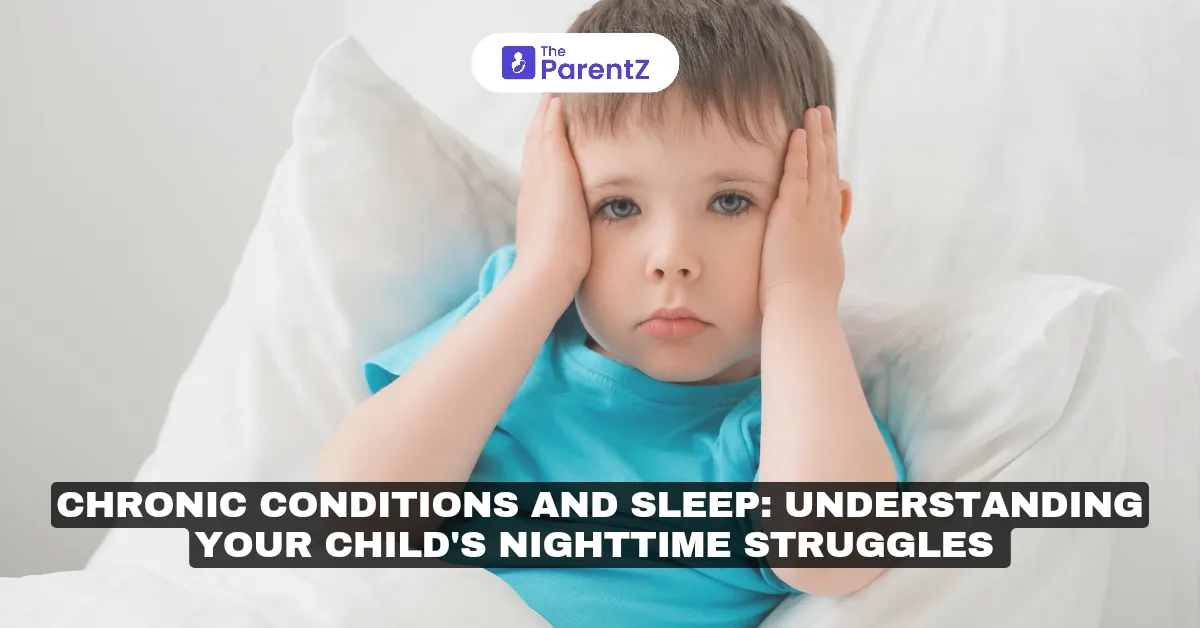Parenting a child with a chronic condition is like being a nighttime superhero – part navigator, part comforter, and full-time problem solver. These conditions vary from asthma and diabetes to anxiety and ADHD, each impacting sleep in unique ways. Here, sleep becomes more than just rest and turns into a critical component of healing, management, and emotional well-being. As a parent, understanding the intricate relationship between chronic conditions and sleep helps you navigate these challenges and provides the support your child needs.
Asthma
Children with asthma often experience nighttime symptoms that can interrupt sleep, such as coughing, wheezing, or shortness of breath. These symptoms can lead to frequent awakenings and a reduced ability to reach deeper sleep stages.
- What Parents Can Expect: You may notice your child waking up frequently during the night or feeling tired during the day.
- How to Handle It: Ensure that your child’s asthma is well-managed with the appropriate medications and an action plan. Keeping their sleeping environment free from allergens (dust mites and pet dander) can also help minimize nighttime symptoms.
Diabetes
Children with diabetes may experience fluctuations in blood sugar levels that can disrupt sleep. Low blood sugar (hypoglycemia) during the night can cause sweating, nightmares, or even confusion when they wake up.
- What Parents Can Expect: You might see your child waking up more often or exhibiting signs of fatigue due to poor overnight blood sugar control.
- How to Handle It: Work closely with your child's healthcare provider to establish a consistent routine for monitoring blood sugar levels before bed. Ensure they have a healthy snack if needed before sleeping and educate them about recognizing symptoms of low blood sugar.
Attention Deficit Hyperactivity Disorder (ADHD)
Children with ADHD often struggle with hyperactivity and impulsivity, which can make it difficult for them to settle down at night. Additionally, they may experience co-occurring conditions like anxiety or depression that further complicate their sleep.
- What Parents Can Expect: Your child may have difficulty falling asleep or staying asleep, leading to daytime drowsiness and irritability.
- How to Handle It: Establish a calming bedtime routine that includes winding down activities like reading or gentle stretching. Consistency is key; try to keep the same bedtime every night. Consult with a healthcare professional about behavioral strategies or medications that may help manage ADHD symptoms impacting sleep.
Anxiety Disorders
Anxiety can significantly interfere with sleep, leading to difficulties falling asleep or staying asleep due to racing thoughts or worries about school, friends, or other stressors.
- What Parents Can Expect: You might notice your child expressing fears about going to bed alone or having trouble settling down at night.
- How to Handle It: Encourage open conversations about their worries and validate their feelings. Consider relaxation techniques like deep breathing exercises or mindfulness practices before bed. If anxiety persists, seeking help from a mental health professional may be beneficial.
Chronic Pain Conditions
Conditions like juvenile arthritis or fibromyalgia can lead to persistent pain that disrupts sleep quality. Pain can make it difficult for children to find a comfortable sleeping position or lead to frequent awakenings throughout the night.
- What Parents Can Expect: Your child may complain about difficulty falling asleep due to pain or waking up frequently during the night.
- How to Handle It: Work with your child's healthcare team and make an effective pain management plan. This might include medication, physical therapy, or alternative therapies such as acupuncture or massage. Creating a comfortable sleep environment with supportive bedding can also help alleviate discomfort.
Sleep Disorders
Some children may suffer from specific sleep disorders such as insomnia, restless leg syndrome (RLS), or obstructive sleep apnea (OSA). These disorders can lead to significant disruptions in sleep quality and duration.
- What Parents Can Expect: Signs may include snoring, panting for air during sleep, extreme daytime sleepiness, or difficulty falling asleep regularly.
- How to Handle It: If you suspect your child has a sleep disorder, go to a pediatrician or a sleep specialist for proper evaluation and treatment options. Lifestyle changes such as maintaining a regular bedtime schedule and creating a conducive sleeping environment are also essential.
Epilepsy
Epilepsy is known for recurrent seizures. Sleep plays a complex role in epilepsy; poor sleep can increase seizure frequency, while seizures can disrupt sleep architecture.
- What Parents Can Expect: Children with epilepsy may experience difficulty falling asleep, frequent awakenings during the night, and excessive daytime sleepiness. They might also exhibit behavioral issues due to a lack of restorative sleep.
- How to Handle It: Encourage regular bedtimes and wake times to help regulate their circadian rhythm. Keep a seizure diary to track patterns related to sleep disturbances. Discuss findings with your child's healthcare provider. Ensure that the sleeping area is safe in case of nocturnal seizures. Consider using bed rails or placing the mattress on the floor.
Cystic Fibrosis
Children with cystic fibrosis may experience disrupted sleep due to respiratory issues or frequent coughing. Additionally, treatments such as chest physiotherapy may need to be performed at night.
- What Parents Can Expect: Your child may have difficulty settling down due to breathing difficulties or discomfort from treatments. This can lead to fragmented sleep and daytime fatigue.
- How to Handle It: Schedule respiratory treatments at times that minimize disruption during the night. Use a humidifier to maintain humidity levels in the bedroom, and consider elevating the head of the bed if your child has trouble breathing at night.
General Strategies for Supporting Sleep Health
Regardless of the chronic condition affecting your child’s sleep, there are general strategies that can help improve their overall sleep quality:
- Establish Consistent Routines
- Create a Comfortable Sleep Environment
- Limit Screen Time Before Bed
- Encourage Physical Activity
- Monitor Diet
- Stay Informed
Conclusion
Chronic conditions can significantly impact children's sleep health, leading to various challenges for both kids and parents. By understanding how specific conditions affect sleep and implementing effective strategies tailored to each situation, you can provide essential support for your children’s well-being. Remember that communication with healthcare providers is crucial in managing both chronic conditions and associated sleep issues effectively. With patience and proactive measures, you can help your child achieve better rest and improve their overall quality of life.








Be the first one to comment on this story.